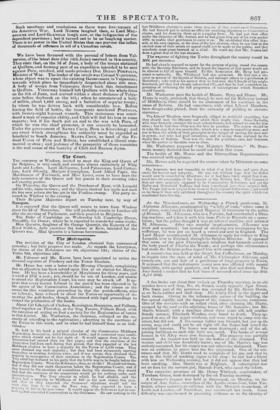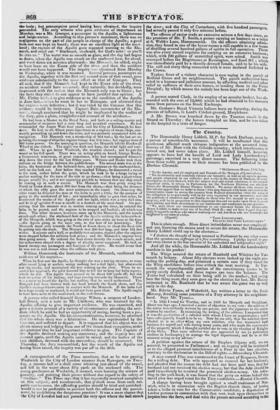A fire broke out about four o'clock on Thursday morning,
in an old wooden house and shop, No. 48, Strand, nearly opposite Agar Street. The frent part of the premises was occupied by Mr. Henry Harris, as an India-rubber and shell shop. His family lived in the upper and back rooms. Owing to the inflammable nature of the building, the fire spread rapidly, and the danger of the inmates became imminent. One of the servants with an infant child, after alarming Mr. Harris, escaped by the roof to the adjoining house of Mr. Samuels ; but Mr. Harris himself, with a daughter about three years old, and another female servant, Elizabeth Wendon, were burnt to death. They ap- peared at one of the upper windows, and were urged to jump into the
p
street, but did not. A fire-escape ladder was brought, but pit u the wrong way, and could not be set right till the flames had seized the wretched inmates. The house was soon destroyed ; and of the ad- joining buildings on each side little was saved. The hacks of several houses in Of Alley were also damaged. The property was partially insured. An inquest was held on the bodies of the deceased. The woman and child was dreadfully burnt ; one of Mr. Harris's legs was entirely consumed, but his corpse was not °theca ise disfigured. There was no evidence to prove how the fire miginated. One of the wit- nesses said that Mr. Harris used to complain of his gas, and that he was in the habit of smoking cigars in his shop : he had bad a friend with him on Wednesday evening, but it did not appear that they had been smoking. Mrs. Harris was at Brighton. A subscription wee set on foot for the servant-girl, Hannah Ford, who saved the infant.
The extensive premises of Mr. Henry Whitlock, coachmaker, of Turnhani Green, were destroyed by fire on Tuesday morning.
A Coroner's inquest was held at Gravesend, on Monday, on the corpse of Ann Jones, stewardess of the Apollo steam-boat, from Yar- mouth, whose unfortunate collision with the Monarch steam-boat, of Leith and London, off Northflect, was mentioned last week. Some difficulty was experienced in procuring evidence as to the identity of
the body ; but presumptive proof having been obtained, the inquiry proceeded. The only witness who gave evidence of importance on Monday, was a Mr. Granger, a passenger in the Apollo, a lighterman and barge-owner. According to this person's statement, there was no negligence on the part of the people in charge of the Apollo; a good Look-out was kept on board ; there was an excellent light at the mast- head ; the captain of the Apollo gave repeated warning to the Mo- narch, and cried oat " Starboard, starboard, for God's sake ! or you'll be into us." The water was as smooth as glass, and the day bad begun to dawn, when the Apollo was struck on the starboard-bow, far ahead, and went down six minutes afterwards : the Monarch, he added, ought to have been on the Essex side of the river, and then the accident would not have happened. The inquiry was adjourned from Monday to Wednesday, when it was resumed. Several persons, passengers on the Apollo, together with the first and second mate of that vessel, gave evidence substantially to the satire effect as that of Granger. They all said, that if the Monarch bed kept to the Essex side of the river, so accident would have occurred : they naturally, but decidedly, were impressed with the notion that the Monarch only was to blame ; but the facts they stated do not appear to have justified that opinion. A Air. Finley wish, d to give evidence as to the condition of the Apollo in June last,--e hen he went in her to Ramsgate, and observed that her engine, were defective ; but it was ruled by the Coroner that this evidence would be irrelevant. Captain Bain, commander of the Mo- narcle though cautioned that be might be implicated by the verdict of the Jury, gave a plain, straightforward account of the accident— Ile bad been a Master in the Royal Navy, and both as a sailing-master and commander of steamers bad a very long and practical experience. He had commanded the James Watt four years, and the City of Edinburgh for four more. He had, in all, fifteen years experience as a captain of steam-ships, con- stantly proceeding up and down the river, and was perfectly acquainted with its navigation. The Monarch was a steam-ship of 864 tons ; by the last act re- gulating the tonage of ships her register tonage was 834 tons; her engines were of ▪ 2U0 horse power. On the morning in question, the Monarch left the Blackwell Wharf at one o'clock. The night was dark and hazy, the wind light and vari- able. When he got below Woolwich, the weather cleared; and he put the vessel on her full speed. There was an acting pilot on board, George 'Rooke, a Greenwich waterman, of great experience, who had accompanied witness's ship down the river for the last fifteen years. Witness and Rooke took their stations on the bridge between the paddle-boxes. The second mate was at the helm, the boatswain at the larboard-bow, and a seaman on the starboard-bow, !loth on the look out. Just before they reached Tilbury, he discovered a vessel to the west, rather below the point, which he took to be a barge laying at anchor waiting for the turn of the tide to go down,—that being a place where tinges usually lie; and it not appearing possible to witness that any ship could be coming up in such a course. The Monarch was then going along the North or Essex shore, about 300 feet from the shore,—that being the distance at which the eddy gave the most assistance to the vessel. On observing the other vessel he directed the man at the helm to port a little, for the purpose of going to the southward of her ; and immediately after be gave that order, he discovered the smoke of the Apollo and her light, which was a very dull one, and he is of opinion it was a candle in a lantern at the mast-head. On per- ceiving that the steamer was in motion coming up the river, be ordered the helm to be ported, and the engines to be stopped and backed ; all which was done. The other steamer, however, came up to the Monarch, and the vessels
struck each other; the starboard of the Apollo striking the larboard-bow of the Monarch, which was going at the rate of nine miles an hour at the time —the Apollo going at the same rate, to the best of his knowledge. The Monarch went over towards the North or Essex shore, to cheat the flood-tide by getting into the slack. The Monarch was 206 feet long, and drew 13b feet water. A minute and a half, or probibly two minutes, elapsed after the engines were stopped before the collision took place ; and the Monarch's engines were then going astern. He ordered the boat down directly the vessels struck, and his orders were obeyed with a degree of alacrity never surpassed. He took on beard twenty-one passengers and fourteen of tire crew. He would swear that he was not in mid-stream when the collision took place.
William Hammond, the boatswain of the Monarch, confirmed the evidence of his captain— When lie first saw the Apollo, be thought she was a towing steamer, or some ether vessel lying at anchor, seeing nothing but a dull light ; but afterwards saw the smoke, and ascertained she was coming up the river. When he re- sumed her approach, the pilot directed him to tell her to keep her helm a-port; Which lie thd. The Apollo then seemed to be about 100 yards off; but she took 110 notice of his hailing, and kept coming towards the Monarch. There w a Liaise on board the Apollo, but nothing that he could understand. The Monarch had been thrown with her head towards the South shore, and the Alwllu st.i16thil.l.bows came in contact with the Monarch. if the helm had been kept steady or starboard, it Would not have gone clear. The Apollo ought to have been more to the southward, in the mid-stream.
A person who called himself George Wilson, a surgeon of Leaden. hall Street, sent a note to Mr. Clarkson, who was retained for the Apollo, offering to give important evidence. He was examined, and gave a minute account of a variety of circumstances attending the acci- dent, which he said he had an opportunity of seeing, having been a pas- senger on the Apollo. On his cross-examination, however, he admitted Prat his whole story was a fabrication. He was reprimanded by the Coroner, and suffered to depart. It is supposed that his object was to obtain money and lodging from one of the steam-boat companies, under am pretence that he had important evidence to give. The Captain of tire. Apollo declined making any statement ; and the inquiry was ad- journed again, until the Apollo could be raised, and the bodies of the two children, drowned with the stewardess, should be recovered. On Thursday, the Jury reassembled; but the wreck of the Apollo not laving been raised, the inquiry was put off to the 26th.



























 Previous page
Previous page